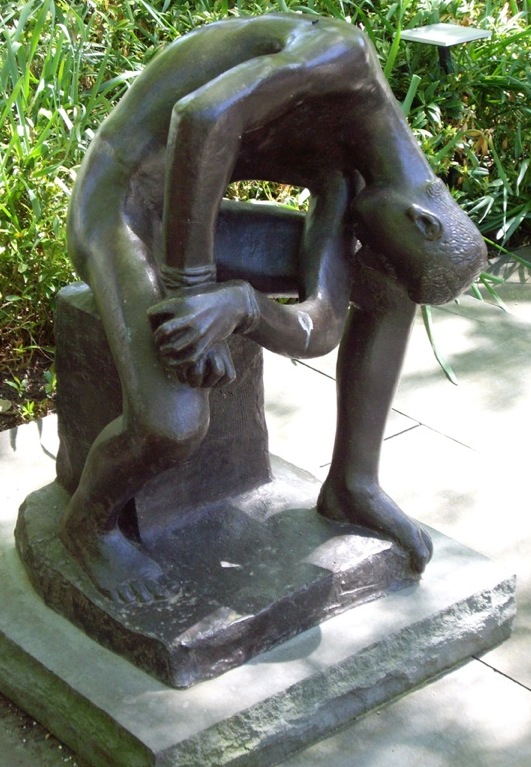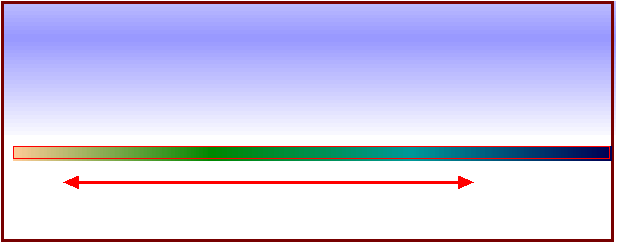 Rhetorical deceits or conceits?
Rhetorical deceits or conceits? Navigating the site:
Analysis of science & economics
Deirdre N. McCloskey, Ph.D.
The Rhetoric of Economics. (1985, 96)
The struggle to maintain an adequate–if not accurate–description of commercial exchange.
![]()
define rhetoric | goal | analytical example | science | deconstruction's value | rhetorical tetrad | Saussure's idea | method
![]()
Changes in rhetorical stance | John K. Galbraith | Dean Baker | Cycles
Prometheus Bound, sculpture garden, by G.Marks, 1944. Baltimore Museum of Art
“The paying attention to one’s audience is called ‘rhetoric,’ a word that I later exercise hard.”
p. xix
Rhetoric means far more than mere voice or tone, rhetoric is a set of rules:
“...the word has also been used in the broader sense, to mean the study of all the ways of accomplishing things with language: inciting a mob to lynch the accused, but also persuading readers that a novel’s characters breathe, or bringing scientists to accept the better argument and reject the worse.”
pp. xix-xx,
Here McCloskey quotes William, Booth [1974]
Defining rhetoric as “the ‘art of discovering warrantable beliefs and improving those beliefs in shared discourse.”
Hence, rhetoric is associated with these words:
- persuasive
- reasonable
- credible
- mutual investigation
- reliable
- exposition
speaking clearly to a “community of voices” – other listeners and speakers
Using a play on definitions of economics McCloskey says:
“Rhetoric …is the proportioning of means to desires in speech.”
Rhetoric from a economics' perspective is defined by McCloskey [ DM ] as ‘the study of how scarce means are allocated to the insatiable desires of people to be heard.”
Goal: To “help the field mature as a science, not attack it.”
p. xx.
This book is “a rhetoric of inquiry” into “the science of the human maximization under constraints…”
always ask how is it persuasive; what is the means used to persuade?
Chapter 1
How to do something –anything?
“In culture of scarcity, this is an urgent, an inescapable question.”
Richard Posner, Economic Analysis of Law, 1972, p. 98.
McCloskey says Posner's meaning is that the common law operates in an economically efficient manner.
“the philosophical way of seeing through. But look at the surface, the rhetoric.”
p. 3
Treble repetition – in classical rhetoric is commoratio
pp. 3-4“The rhetorical reading is at least richer than the reading invited by the passage itself, which claims to represent the world.”
p. 4“we need to do both,…to know what the passage says but also how it achieves its end, persuasion.”
The Greeks called “writing with intent” rhetoric
“often unrecognized, the core of humanistic learning.”
“we need a scholarly word for wordcraft. The ancient and honored one [rhetoric]
will do.”
She argues [despite what newspapers have done to the term – made rhetoric synonymous with frill, ornament, style over substance]p. 5.
“Likewise we need terms to describe scientific argument, or else we are reduced to the vague unexamined aesthetics of ‘deep,’ ‘rigorous,’ ’elegant,’ ‘convincing.’ Gerard Debreau…uses such terms to defend abstract general equilibrium analysis…”
p. 5.
Fundamentals of rhetorical discourse:
Define an ethos – character and persona—implied author
“the implied author chooses a vantage point –" point of view
pp. 8-9.
“The Greeks and Romans divided rhetoric into Invention (the finding of arguments), Arrangement, and Style (They included fourth an fifth categories, Memory and Delivery, less important in a literary and electronic culture)."
Five ancient categories of rhetoric:
- Invention
- Arrangement
- Style
- Memory
- Delivery
p. 10.
" 'Style versus content' is a rhetorical commonplace of our post-rhetorical culture, most common since the seventeenth century. But the modern premise that content can be split from expression is mistaken."
Comment: Our capacity to separate form from substance may be the inherent origin of the dichotomy produced in Anglo-American thought since the Renaissance wherein we come to value function to the exclusion of appearances and thus not seeing what 19th century architects argued that: "form follows function."
Science discussing the wider meaning of systematic understanding:
“The parallel technique in science might be called ’represented reality’ or unheralded assertion’ or ‘style indirect inevitable.’ The scientist says, It is not I the scientist who make these assertions but reality itself (Nature’s words in scientists mouth).”
p. 9
“Scientists pretend that nature speaks directly.”
p. 10
The scientist avoids being questioned for his/her reliability by disappearing into a third person narrative of what really happened.”
p. 10
Science
"But in French and German, and every other language I have looked into, the term is not properly understood as English 'science.' In Japanese, Finish, Tamil, Turkish, Korean, and all the Indo-European languages, the science word means 'systematic inquiry.'... It means in all these other languages merely 'disciplined inquiry,' as distinct from, say, casual journalism or unaided common sense."
p.20.
"The began to be used in the honorific sense by the English only in the late nineteenth century. The earliest citation...of the Oxford English Dictionary is 1867 from W. G. Ward... expressing physical and experimental science, to the exclusion of theological and metaphysical."
p. 20.
Style is an an appeal to authority
Economic style appeals in various ways to an ethos worthy of belief. For example, a test of claiming authority uses the 'gnomic present,' as in the sentence you are reading now, or in the Bible, repeatedly in the historian David Landes's well-known book on modern economic growth, The Unbound Prometheus (1969)....The advantage of the gnomic present is its claim to the authority of the General Truth, which is another of its names in grammar."
p. 11.
Deconstruction has value in that it opens up, analyzes, or unpacks the hidden meaning and style used in rhetorical constructions of ; drawing the two different forms of discourse more closely together. So closely drawn together are fiction and non-fiction that many people are uncomfortable with recognizing how often fact and opinion blend into one another due to a scarcity of relational evidence among facts.
DM argues that deconstructing the words writers use introduces the valuable concept of " verbal hierarchy”
“The point is simply that words carry with them a ranking with respect to their opposites…A sentence will achieve some of these effects by playing on these rankings….The hierarchies expose the politics (so to speak) in writing.”
p. 16
“the product not merely of sober thinking. But also of subconscious wishing.”
Wesley Clair Mitchell on the fact that economics is the product of economic history, so to speak“The first term of each is the privileged on—except that in the pairs leads / [compels] … they are in fact polite self-deprecation, with ironic force: Mitchell is on the contrary claiming the commanding heights of compelling add grounded conviction, not the soft valleys of mere gently leading ‘views.’ Literary people speak of ‘deprivileging’ the superior term in such pairs.”
Pp.16-17.
“The deeper point deconstruction makes is that among the mind games in which all writing participates is the claim that writing is the world. The realistic novel is the plainest example, but scientific writing is another. For example the phrase ‘it is obvious that’ conveys certitude in mathematics and in economics.”
“But nothing is obvious on a printed page except that certain marks have been made on a white field. The ‘easily seen’ is evoked in the mind’s eye.”
p. 17.
Writing | writing from texts | how to approach writing | writing papers | writing & world views
| Writing is Performance | ||
 |
||
| “Books do not reproduce the world. They evoke it." | ||
“Skillful fiction ‘stimulates us to supply what is not there,’ as Virginia Wolf remarked of (Jane) Austen." P. 17.
“Economics is a science…too. But a serious argument for economics will use metaphors and stories as well—not for ornament or teaching alone but for the very science." |
||
| Sculpture of an Egyptian scribe with a stylus used for writing on papyrus, from the Old Kingdom. | ||
| Fact, logic, metaphor, and story. | ||
|
||
| p.13. | ||
Figure 1. The Rhetorical Tetrad
Impersonal personal p. 19.
“The reasons to do a rhetorical analysis of an economic text are various: to understand it, to admire it, to debunk it, to see it beside other works of persuasion in science, to see that science is not a new dogma but is thoroughly and respectable part of the old culture.”
p. 19.
Saussure in defining linguistics in 1915 –created a useful model for sciences by separating diachronic from synchronic facets of language formulation. He thus distinguished synchronous from past events, or the current use of language from its etymological development.
P. 28
Two complementary approaches: diachronic vs. synchronic differ
viewpoint Diachronic Synchronic meaning happening again over time
historical & etymological
similar times, same time.
simultaneous or contemporary usage
example (historical & etymological versus simultaneous or contemporary usage)
" Y "
≠
|
|
|
|"X"
Synchronic"The founder of modern linguistics, Ferdinand de Saussure devoted many pages to the analogy between economics and his new linguistics.
Saussure distinguished two approaches to understanding societies, the diachronic and the synchronic. The diatonic (greek for 'through time') was the historical, dynamic or (as economists would say) time-series approach typical of the linguistics of his day.
What was needed to understand the way language worked at any one time was a synchronic ('same time') linguistics, an ahistorical static, cross-sectional account of how one French speaker speaks to another."
pp. 28-29.
"The experience (in literary term, the narrative, or in novelistic terms, perhaps the dialogue) is the phenomena to be theorized about. You have to have direct grasp of the diachronic subject to have something to be synchronic about."
pp. 30-31.
"Economic history is in this view the raw material for synchronic thinking. It becomes part of what the chemist and philosopher Michael Polanyi called the 'tacit knowledge' about which the theorizing speaks. Synchronic theories such as neoclassical economics or Saussurean linguistics are suitable for mathematization."
p. 30
Markets illustrated | quality of markets | market defined
Economics
"It keeps trying, and keeps failing. Economics has seen various projects to make the subject dynamic, bring it into real time, to give it an historical perspective, to find out how much labor power is embodied in surplus value, to make it in a word, diachronic.
The comparison with synchronic linguistics suggests why the projects have failed to deflect economics from its static purity. Marxism, the German Historical School, Institutionalism, new and old, have been trying to graft diachronic limbs onto a synchronic tree. The limbs keep falling off, to grow and flourish perhaps by themselves,"
pp. 30-31.
“Some literary critics have been bold enough to begin. An economist hearing someone talking about 'human action,' distinct from 'mere motion,' such as the tides insensate have, attacking the behaviorist hallucination that man is a large rat, emphasizing the the purpose-ness of human affairs and brining this together with a declaration that 'the resultant of many disparate acts cannot itself be considered an act in the same purposive sense that characterizes each one of such acts...."
She argues based on her having discerned a difference between the personal or individual action and the aggregate or summary behavior of many people.
Pp. 31-32 .
Source:
The Rhetoric of Economics
Deirdre N. McCloskey
Madison: University of Wisconsin Press, 1998 (2d ed.) [1985]
![]()
define rhetoric | goal | an analytical example | science | deconstruction's value | rhetorical tetrad | method
Changes in rhetorical stance | John K. Galbraith | Dean Baker | Cycles
Science Index | Comparative values | Population Index | Global Warming Index | Nature Index | Matrix compared | Brief




